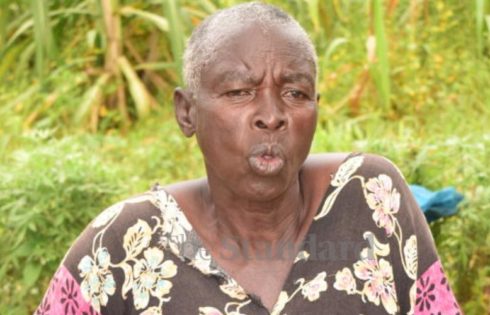By Timothy Oyomare
Angelina Khalibwa, 73, has seen it all. From visiting herbalists, conventional doctors to endless prayers.
She was blessed with 13 children – five of them died mysteriously, three are mentally ill and the rest, who Khalibwa thought would grow up normally, have started exhibiting strange characteristics and are acting like zombies.
“Sometimes, I think that I am bewitched. Life has become meaningless. My husband died and I have been left with the burden of raising the children single-handedly,” she says.
She went on: “I wash them and their bedding, remove jiggers from their bodies and spoon feed them like small children, just the way I used to do when they were young.”
Khalibwa said her first five children died under mysterious circumstances before celebrating their sixth birthdays.
She said the first and second-born died when they were just two months and three years old while asleep.
The third, fourth and fifth children died later aged between four and six years.
The children would complain of dizziness, headache and loss of appetite and die shortly afterwards.
“None of them was diagnosed with any health complications and they were never given any prescription save for painkillers. But their conditions would worsen whenever we returned home and that is how I lost the children one by one,” said Khalibwa.
And when she thought that her predicaments were over, another tragedy hit her, this time affecting three of the remaining eight children who are now suffering from mental illness.
Her sixth born son (Caleb Bulemi), who was 10-years-old, fell unconscious in 1982 and was rushed to Kakamega General Hospital for treatment. Medical tests did not reveal what he was suffering from.
Bulemi was a Standard Three pupil at Injira Primary School in Shinyalu. She said medics at the hospital advised them to look for traditional herbalists to treat Master Bulemi but that, too, did not work.
“He felt dizziness for 12 consecutive months and later, he was infected with jiggers, worsening his condition. For the last 39 years, my son has been suffering from mental illness that has taken a toll on him,” says Khalibwa.
As the interview was in session, Bulemi walked out of his house and angrily tore his clothes.
He had bloodshot eyes, dry and cracked lips. Irritated, he went back into the house hurling unprintable words at us.
Khalibwa, who seemed unmoved by the son’s circus, told us that those are the kind of things she has been enduring for the last 39 years.
“My sons, I have suffered a lot and I even regret why I was born and got married into this family. I do not know the sins I committed to warrant the kind of suffering I have been subjected to by nature. I only get solace in trusting in God who has kept me alive to look after the children,” said Khalibwa.
In 2014, his only daughter (Noel Musabi, 35) who had separated from her husband after a domestic brawl came back home with her two children.
This was to give mediation a chance so that she could go back to her matrimonial home. But as fate would have it, Musabi’s husband died before mediation talks could take place. According to Khalibwa, a few months after her daughter’s husband was buried, she started complaining of persistent chest pains and headache, dizziness and breathed with difficulties.
“We took her to Kakamega County Teaching and Referral Hospital where she was admitted for two-and-a-half months. Upon recovery, we were slapped with a Sh50,000 bill, forcing us to sell a quarter piece of land at a throw-away price to clear the bill,” said Khalibwa.
She said that her daughter was in good health for only two months before falling sick again and when they took her back to the hospital, it was discovered her brain had been badly affected and she became mentally ill.
Khalibwa said she was advised to look for traditional herbalists to treat her but she regrets taking the advice as the concoctions administered did not make any difference.
“The herbalists (madaktari wa kienyeji) could demand that we slaughter a black hen for them to eat together with my ailing daughter. They also demanded roasted groundnuts, simsim, fish and Sh10,000. They spent the night at the homestead and when they left, all was well until in the evening when all hell broke loose,” recalled Khalibwa.
“My daughter became violent and wrestled anyone who dared cross her path but we managed to overpower her and tied her with ropes. She has refused to put on clothes for the last seven years and does worse things,” she said.
Khalibwa said that her daughter always fights with invisible forces and now, her body has been infested with jiggers.
Her granddaughter, who is 16 years old, got pregnant but the man responsible disappeared.
According to Khalibwa, the teenager is one month shy of giving birth “yet I can hardly help her deliver safely and take care of the baby”.
Last month, another granddaughter, also aged 16, gave birth and Khalibwa has been struggling to take care of the younger mother and her baby.
Her last born son, Kalaka Ngaira, is not only mentally ill but also an alcohol addict.
Dr Joshua Azere, a surgeon based at Kakamega County Teaching and Referral Hospital, said mental illness is sometimes hereditary and runs in families but it can be reversed if proper interventions are made.
“Most of the cases we have encountered are driven by socio-economic factors like poverty and jigger infestation. The victims are stigmatised and even shunned by society that perceives that they (victims) have been cursed,” said Dr Azere.
He added: “The psychological impact on the victims is that they feel isolated and rejected and when it goes into the mind, they assume something is wrong thus causing mental illness. The families of the victims should visit public health offices for advice since the condition can be treated.”
-The Standard


